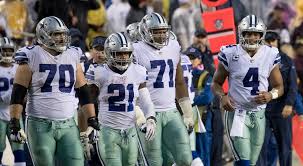Film Study: Cowboys OC Moore's dazzling debut

- Country:
- United States
By the numbers, new Dallas Cowboys offensive coordinator Kellen Moore's debut Sunday against the New York Giants couldn't have gone much better. His unit piled up 494 yards despite a quiet run game (89 yards, 3.0 per carrying) and scored five straight touchdowns to decide matters in three quarters.
On film, Moore's debut was just as dazzling. It would be silly to say he mashed the league's best offensive schemes into one playbook, but nonetheless, there were elements from the Chiefs, the Rams, the Patriots... and even a Lincoln Riley special from Oklahoma.
The modern approach was extremely refreshing compared to previous coordinator Scott Linehan. Despite occasional changeups, Linehan stubbornly leaned on static formations and isolation routes, relying on players (not scheme) to get themselves open. Moore's scheme is from a different dimension, which was clear from his first NFL play call. With 9-man protection, he called for two triple moves (stop-go-and-stop) outside, virtually an impossible route to cover with time (hence the 9-man protection).
From there, Moore layered in several packaged plays, primarily run-pass options, offering either a numbers advantage on a frontside run or an easy throw for Dak Prescott with two O-linemen passes protecting on the backside. One of Andy Reid's staples in Kansas City, Dallas' RPOs are made more dangerous by the Cowboys' run game. Prescott threw on seven packaged plays because New York overplayed the run (which is why Dallas was so pass-heavy early). Moore put his own flavor on RPOs by running most with pull blockers, rather than traditional zone, usually with pin-and-pull designs attacking the perimeter. Using pullers -- which he also did on many play-action designs -- provides a juicy key for linebackers to bite on, one of Josh McDaniels' staples in New England.
Much like the Chiefs and Patriots, the Cowboys employed myriad formations and pre-snap motions, putting receivers in advantageous spots while providing Prescott information via the defense's movement (or lack thereof). A 10-yard screen to Ezekiel Elliott featured three shifts before a jet motion, which drew attention to the left as Elliott leaked outright, the sort of window dressing that would make Reid and McDaniels proud. Various jet motion (both run and pass) and condensed formations reminded of Sean McVay's Rams, with Elliott's rushing TD a perfect example. There was even one of Riley's favorite routes: a stop-and-go deep over by Amari Cooper on the Cowboys' first play of the second half, an easy 45-yard gain.
Moore also cleverly leveraged designs off each other, like an RPO and a fullback wheel route in the second quarter. With Randall Cobb in reverse motion from right to left at the snap, the O-line blocked to run right while Prescott hit Cobb's flare for 18 easy yards. Three plays later, Dallas showed the same motion but faked the flare and leaked FB Jamize Olawale wheel route to the right. A possible touchdown, Prescott underthrew Olawale after pressure affected the timing, and it was broken up. Prescott's ball placement was erratic at times, but you'd barely notice because Moore's plan created so many easy completions. That's the beauty of a sharp scheme: It manufactures easy yards so the quarterback isn't always doing the heavy lifting.
Of course, Prescott had a big hand in his perfect passer rating, most notably on two gorgeous fades -- a 35-yarder to Michael Gallup and the 21-yard TD to Cooper -- and a 62-yard strike to Gallup on third-and-8 in the third quarter. After using a hard count to diagnose the defense, Prescott audibled to a "cross-country dagger" concept, using Cobb's vertical route to clear out Tampa-2 middle linebacker Alec Ogletree and open Gallup's dig. Prescott's bullet hit Gallup in stride, maximizing yards after the catch. Now it gets tougher for Dallas.
Prescott didn't become a superstar quarterback overnight, but the pending free agent's price tag will climb considerably if he keeps producing at Sunday's pace. The Cowboys can try to argue Moore's scheme -- and not Prescott -- is the key, but that won't work in negotiations. As for Moore, he must craft new, diverse and creative game plans while better defenses learn from his film. He won't get a Giants defense falling all over itself every week. (The defense was more culpable than the offensive scheme on several huge plays Sunday, including touchdowns to Blake Jarwin, Jason Witten and Cobb, plus Cooper's 45-yarder).
For now, the early signs are extremely promising, offering hope of a higher-ceiling Cowboys offense than in recent years. Extra points:
-Kyler Murray's first NFL touchdown came on a delightfully clever design from Kliff Kingsbury. From a condensed 2x2 formation, Kingsbury ran mirrored "bench" concepts (a quick out underneath a corner route) to each side, drawing almost every defender toward the sideline. That opened the middle for David Johnson, who ran a seam against overmatched linebacker Jalen Reeves-Maybin for an easy score. -The "leak" concept (also called "throwback") remains one of football's deadliest plays, as Sammy Watkins (his second) and Danny Amendola showed on wide-open touchdowns Sunday. New Bengals head coach Zac Taylor also unveiled a cousin of the design, in which John Ross crossed the formation behind the line (on jet motion) before wheeling up the far sideline, with a flea-flicker fake to freeze the linebackers. That's downright ruthless.
-Washington third-round rookie Terry McLaurin is raw, but his speed is deadly in Jay Gruden's shrewd designs. Gruden freed McLaurin on two post routes running away from single coverage on Sunday -- Case Keenum hit one for a 69-yard score but overthrew a would-be 73-yard TD.
(This story has not been edited by Devdiscourse staff and is auto-generated from a syndicated feed.)










